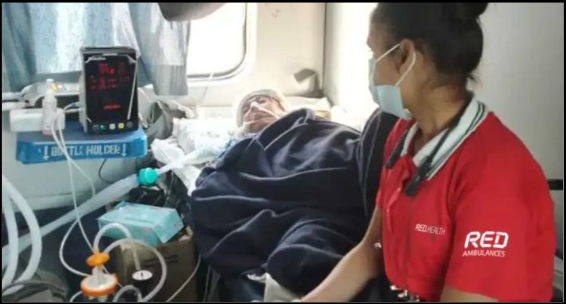In a country as vast and diverse as India, providing timely and efficient medical transportation across long distances remains a challenge. While air ambulances offer speed and road ambulances provide local accessibility, train ambulance services strike a unique balance between cost, coverage, and critical care. With the expansion of railway infrastructure and improvements in onboard medical facilities, train ambulances in India are becoming an indispensable part of the emergency medical transport system.
What is a Train Ambulance?
A train ambulance is a specially configured railway coach equipped with advanced life-support systems, stretchers, oxygen cylinders, ventilators, ICU setups, and a dedicated medical team. It functions like a mobile intensive care unit, enabling the transport of critically ill or injured patients over long distances where other modes may be too expensive or logistically complex.
Growing Need for Train Ambulance Services in India
India’s demographic and geographic diversity demands varied modes of medical transportation. Remote towns, rural areas, and even Tier 2 and Tier 3 cities often lack access to specialized healthcare facilities. In such cases, train ambulance services in India play a crucial role by:
- Ensuring long-distance patient transfers from rural hospitals to metropolitan medical centers.
- Reducing costs significantly when compared to air ambulance services.
- Providing ICU-level care during the journey, minimizing risks associated with long-distance travel.
Features of Modern Train Ambulance Services
Modern train ambulance services in India are designed to offer maximum safety, comfort, and continuity of care. Key features include:
- Advanced Medical Equipment
These ambulances are outfitted with ventilators, defibrillators, cardiac monitors, infusion pumps, and other critical care tools. - ICU Setup
The coach functions as a full-fledged ICU, making it suitable for transporting patients in critical condition. - Medical Personnel
A trained team including doctors, nurses, and paramedics accompanies the patient, providing real-time care and intervention when needed. - Customized Patient Space
Depending on the number of patients, coaches can be customized for single or multiple patient transfers, ensuring space and hygiene. - Meal and Accommodation Arrangements
In longer journeys, caregivers or family members are provided with basic amenities for food and rest.
Benefits of Using Train Ambulance Services
- Cost-Efficiency
Compared to air ambulances, train ambulances are 60-80% more economical, making them accessible to a larger segment of the population. - Coverage Across India
Indian Railways has an expansive network reaching even the most remote areas, making train ambulances ideal for pan-India medical transfers. - Stability and Comfort
Train journeys are smoother than road ambulances over long distances, especially for patients with trauma, fractures, or neurological issues. - Availability for Non-Emergency Transfers
Besides emergencies, train ambulances are used for transferring patients needing elective surgeries, long-term treatments, or rehabilitation.
Use Cases of Train Ambulance Services in India
- Post-Operative Transfers
Patients who need continuous monitoring after complex surgeries can be safely transferred to their hometowns. - Cancer and Dialysis Patients
Regular and comfortable long-distance transport is arranged for patients requiring frequent travel to specialized centers. - Disaster Response and Mass Casualties
Train ambulances have played vital roles in disaster-hit zones, offering scalable solutions for bulk patient movements.
Challenges Faced by Train Ambulance Services
While the model is promising, train ambulance services in India do face several challenges:
- Scheduling with Railways: Timely allocation of coaches requires seamless coordination with Indian Railways.
- Infrastructure Gaps: Not all stations are equipped to handle medical-grade boarding/unboarding.
- Public Awareness: Many people are still unaware of the availability and advantages of train ambulance services.
Leading Providers of Train Ambulance Services in India
Several private and public players offer train ambulance services across India. Some notable ones include:
- RED.Health
- Medivic Aviation
- Falcon Emergency
- King Ambulance
- Air Rescuers
These companies work in collaboration with Indian Railways to ensure quick turnaround times and high standards of patient care.
The Future of Train Ambulance Services in India
The future looks optimistic for train ambulances in India. With increased government support, policy standardization, and private sector innovation, we can expect:
- Faster approvals and coach allocations
- Dedicated medical train corridors
- Integrated telemedicine support
- Enhanced multi-modal emergency networks
As train ambulance services continue to evolve, they are set to become a cornerstone of India’s emergency medical transport landscape—especially in scenarios where affordability, distance, and continuous care intersect.
Conclusion
Train ambulance services in India are more than just a mode of transport; they are a life-saving bridge between underserved areas and advanced healthcare systems. Their growing relevance in long-distance patient transfer, disaster management, and cost-effective emergency care makes them a crucial component in building a more inclusive healthcare infrastructure. With further development and awareness, train ambulances will continue to save lives and transform how India handles medical emergencies across vast geographies.

